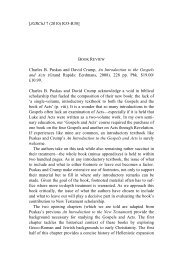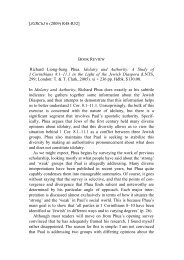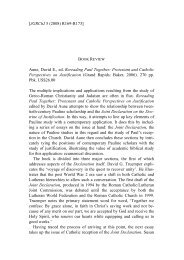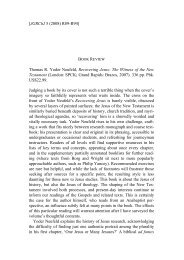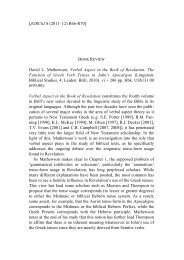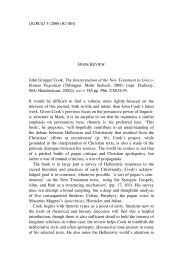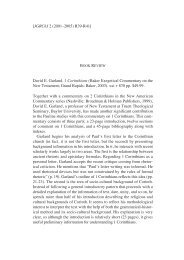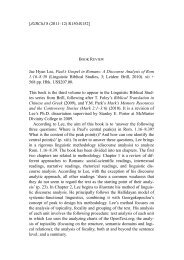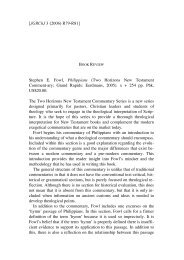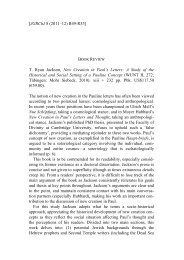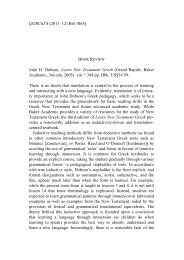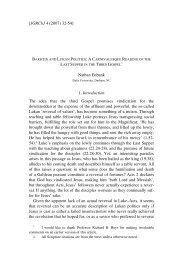The Politics of Ephesians and the Empire - Journal of Greco-Roman ...
The Politics of Ephesians and the Empire - Journal of Greco-Roman ...
The Politics of Ephesians and the Empire - Journal of Greco-Roman ...
Create successful ePaper yourself
Turn your PDF publications into a flip-book with our unique Google optimized e-Paper software.
Gupta & Long <strong>Politics</strong> <strong>of</strong> <strong>Ephesians</strong> <strong>and</strong> <strong>the</strong> <strong>Empire</strong> 131<br />
A 23 o3ti a0nh/r e0stin kefalh\<br />
B th=j gunaiko\j<br />
C w(j kai\ o9 Xristo\j kefalh\<br />
D th=j e0kklhsi/aj,<br />
E au0to\j swth\r tou= sw&matoj: [motivational basis]<br />
D 24 a0lla\ w(j h9 e0kklhsi/a u9pota&ssetai<br />
C tw|~ Xristw|~,<br />
B ou3twj kai\ ai9 gunai=kej<br />
A toi=j a0ndra&sin e0n panti/.<br />
Note <strong>the</strong> paired elements: in A, a0nh/r; in B, gunh/; in C, Xristo/j; in D,<br />
e0kklhsi/a. In its placement, <strong>the</strong> swth/r clause, as <strong>the</strong> chiastic center<br />
<strong>of</strong> 5.23-24, continues to build upon <strong>the</strong> prevalent head-body political<br />
metaphor.<br />
<strong>The</strong> clause, <strong>the</strong>n, involves a fur<strong>the</strong>r politically subversive point by<br />
comparing Christ-Savior/church to Caesar-Savior/Roma. <strong>The</strong> emperor<br />
as savior (swth/r) had a gamos relationship with Rome, a city that was<br />
actively <strong>and</strong> strategically depicted as deified Roma. 73 <strong>The</strong> importance <strong>of</strong><br />
this relationship, Roma with Caesar, was seen across <strong>the</strong> empire, for ‘in<br />
<strong>the</strong> provinces <strong>the</strong> regulation was that temples were acceptable only if<br />
Dea Roma shared in <strong>the</strong> cult’ with <strong>the</strong> emperor (Suetonius, Aug. 52). 74 In<br />
relation to Ephesus, Ronald Mellor summarizes,<br />
Ephesus shows <strong>the</strong> clearest historical development <strong>of</strong> <strong>the</strong> cults <strong>of</strong> Roma:<br />
first, Roma alone; <strong>the</strong>n Roma <strong>and</strong> [<strong>the</strong> <strong>Roman</strong> Proconsul Publius Servilius]<br />
Isauricus; <strong>the</strong>n <strong>the</strong> provincial temple <strong>of</strong> Roma <strong>and</strong> Julius Caesar (29 bc);<br />
<strong>and</strong> finally, by 5 bc, a municipal cult <strong>of</strong> Roma <strong>and</strong> Augustus. <strong>The</strong> cult <strong>of</strong><br />
Roma was important at Ephesus <strong>and</strong> a temple <strong>of</strong> <strong>the</strong> goddess is likely. 75<br />
73. R. Mellor, QEA ROMH: <strong>The</strong> Worship <strong>of</strong> <strong>the</strong> Goddess Roma in <strong>the</strong> Greek World<br />
(Hypomnemata, 42; Göttingen: V<strong>and</strong>enhoeck & Ruprecht, 1975), p. 195, explains:<br />
‘Suetonius [Augustus 52] tells us that this marriage [between Roma <strong>and</strong> Augustus]<br />
was required in provincial cults by imperial comm<strong>and</strong>, but a similar pattern filtered<br />
down to <strong>the</strong> municipal cults as well.’<br />
74. Duncan Fishwick, ‘Dio <strong>and</strong> Maecenas: <strong>The</strong> Emperor <strong>and</strong> <strong>the</strong> Ruler Cult’,<br />
Phoenix 44 (1990), pp. 267-75 (270).<br />
75. Mellor, QEA ROMH, p. 138. Mellor explains <strong>the</strong> history <strong>and</strong> religious<br />
significance <strong>of</strong> Roma (pp. 199-200): ‘<strong>The</strong> goddess Roma had always played a political<br />
role…Roma existed solely as a divine embodiment <strong>of</strong> <strong>the</strong> <strong>Roman</strong>s <strong>the</strong>mselves <strong>and</strong><br />
thus would not be honored by <strong>the</strong>m. …she [Roma], like patria, symbolized Rome past<br />
as well as Rome present. This use <strong>of</strong> Roma enabled <strong>the</strong> destinies <strong>of</strong> <strong>the</strong> imperial house<br />
to be linked with those <strong>of</strong> <strong>the</strong> state—<strong>the</strong> title pater patriae is one expression <strong>of</strong> this<br />
<strong>and</strong> <strong>the</strong> association <strong>of</strong> Roma <strong>and</strong> Augustus is ano<strong>the</strong>r. <strong>The</strong> goddess was represented



